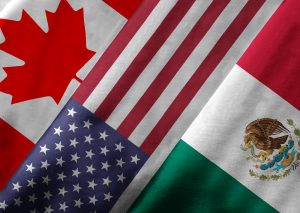 Renegotiation talks for the North American Free Trade Agreement (NAFTA) began in August 2017. Representatives from the United States, Canada and Mexico complete the seventh round of talks on March 6 in Mexico City.
Renegotiation talks for the North American Free Trade Agreement (NAFTA) began in August 2017. Representatives from the United States, Canada and Mexico complete the seventh round of talks on March 6 in Mexico City.
John VanSickle, a professor of food and resource economics at the University of Florida, recently gave a NAFTA update at the Florida Agricultural Policy Outlook Conference. He described how quickly NAFTA renegotiations began after President Donald Trump was sworn into office. On May 15, 2017, U.S. Trade Representative Robert Lighthizer was sworn into his position. On May 18, Lighthizer announced intentions to renegotiate NAFTA. In June, a listening session was held so people could tell the representative how NAFTA has impacted them and their businesses. Then, on Aug. 16, the first round of renegotiation talks began.
According to VanSickle, the original intent to renegotiate NAFTA was to remove growing monopolies and to improve the balance of trade with Mexico and Canada. However, there have been some complications during the talks that have almost derailed renegotiations altogether. For example, VanSickle said that at one point Canada was wanting to trade with China and bring China into the mix of NAFTA. “The United States basically said that’s a poison pill and we won’t continue negotiating if you bring that on us,” VanSickle explained.
Right now, the goal is to finish renegotiations by the end of March, before the Mexican presidential election. However, VanSickle said that timeline is unlikely. “They’re (the renegotiators) going to have to have tremendous progress before they can even bring that forward,” he said. Also, even if an agreement is made during the current round in Mexico City, the decision would still have to go through Congress, which can be a painfully slow process.
VanSickle said another challenge with this timeline is that President Trump does not have trade promotion authority. Trade promotion authority is a legislative process that can be granted to the President by Congress. Essentially, it gives the administration the ability to negotiate trade agreements without interference from Congress. This means that once a deal is negotiated, Congress can still vote yes or no on the decision, but it cannot delay it through a filibuster or proposing amendments. Without this authority, it is difficult to think that renegotiations will be finished by the end of March.
The seventh round of renegotiations is set to end March 6.
Share this Post










